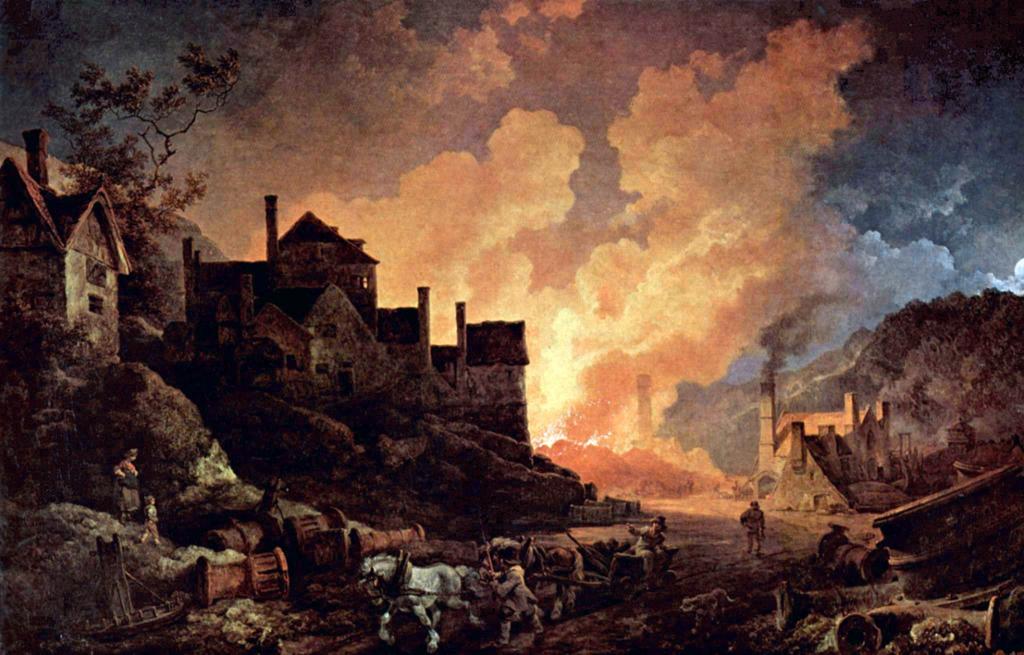Tasks: The Industrial Revolution

Read this excerpt from Charles Dickens' novel Hard Times (1854) which decribes the conditions of living and working in an industrial town. It was based on Dickens' impression of the industrial towns of northern England in the 19th Century.
It was a town of red brick, or brick that would have been red if the smoke and ashes had allowed it; but as matters stood it was a town of unnatural red and black like the painted face of a savage. It was a town of machinery and tall chimneys, out of which interminable serpents of smoke trailed themselves forever and ever, and never got uncoiled. It had a black canal in it, and a river that ran purple with ill-smelling dye, and vast piles of buildings full of windows where there was a rattling and a trembling all day long, and where the piston of the steam engine worked monotonously up and down like the head of an elephant in a state of melancholy madness. It contained several large streets all very like one another, and many small streets still more like one another, inhabited by people equally like one another, who all went in and out at the same hours, with the same sound upon the same pavements, to do the same work, and to whom every day was the same as yesterday and tomorrow, and every year the counterpart of the last and the next.
(from chapter 5, Hard Times by Charles Dickens)
Create:
Write and perform a short play set in the factory town described by Dickens.
Suggested characters:
people who have lived in the town since before it became industrialised
the factory owners
people who have moved to the town to work
a painter or author who is a neutral observer
Child Labor was the norm in the 1800s. Children were employed, for example, in factories, coalmines and as chimney sweeps. Listen to a tour guide talking about the job of a child chimney sweep and answer the questions.
Child Chimney Sweeps
Questions:
How old were the boys who worked as chimney sweeps?
Why did children work as chimney sweeps?
Was the work dangerous?
A Victorian Child Chimney Sweep may have been the most dangerous job for children in the 1800’s, especially when the child first started doing the job. Being sent down the chimney the first several times would cause the child’s arms, elbows, legs and knees to be rubbed and scraped raw. At times their knees and elbows looked like there was no skin at all on them. The boss would then wash their wounds with salt water and send them down another chimney without sympathy.
Falling was a major fear for chimney sweeps or getting stuck in the stacks also, both could cause death very easily. The constant breathing in of soot caused irreversible lung damage in many children. There were a few reported cases of children getting stuck in chimneys and no one even knowing it, leaving them to die alone from exposure or smoke inhalation or worse. I will leave it to your imagination about how terrifying that must have been. The lifespan of Victorian Chimney sweeps rarely made it to middle age.
You can learn more about child labour during the industrial revolution by following the link to the website Victorian Children: Link to article about child labour on the Victorian Children website
Find out:
Find out more about child labour during the industrial revolution and the legislation that was created to prevent the exploitation of children.
Present your findings in a group.
Choose one of the tasks to research. Present your findings in a suitable format.
How did the Industrial Revolution strengthen the United Kingdom's position in the world?
How did the Industrial Revolution spread from the United Kingdom to the rest of the world?
What were the most important inventions of the Industrial Revolution and why were they important?